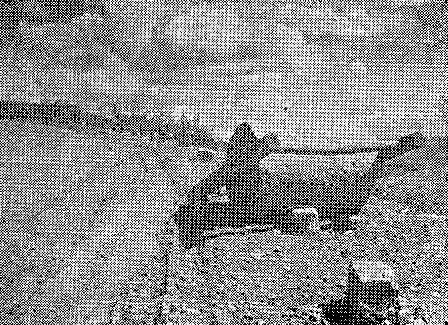
Vol. 1, No. 41 Published by India China Division, Air Transport Command November 1, 1945

|
4,200 ICD Men Leaving For States in November Hq., Calcutta - Shipping quotas have been received from I-B Theater headquarters to date which will allow 4,200 ICD men to be sent to replacement depots for transportation home during November, according to the division personnel section. The first shipment will leave today, Nov. 1. Eighteen hundred men are scheduled to leave from 1332, 1333, 1337, 1348 and 1352 base units for replacement depot No. 5, Chabua, at an average flow of 60 per day. Twenty-four hundred men will move, under quotas as presently set up from the balance of the division bases, excluding China, to replacement depot No. 1, Malir. 19,000 Left Only about a third of the shipping space requested by division headquarters was granted, and there will be little surplus space after all 60-point enlisted men have been sent home. It is hoped, personnel stated, that there will be a sufficient balance toward the end of the month to send some men who have 24 months overseas but who are not eligible for separation. Division physical strength was expected to be down to approximately 19,000 by Nov. 1. According to an Associated Press release to the India press, based on the number of ships scheduled to arrive in Calcutta and Karachi between Nov. 1 and Dec. 25, about 82,000 troops will be handled in that period. This includes China Theater personnel, as well as I-B men, slated to leave from Calcutta. On the basis of ships at present assigned to deployment of U.S. troops in this theater, Army authorities expect to have less than 50,000 Americans left in the I-B Theater by Jan. 1, the release stated. 20,000 Waiting Fourteen ships are booked to arrive in Calcutta by Christmas and will handle 41,400 men, AP said. Karachi is scheduled to get 15 ships during that period to carry approximately 40,300. Both the Calcutta and Karachi staging areas at present are jammed with men waiting to board ships. Calcutta has almost 20,000 men awaiting shipment. Kanchrapara, the main Calcutta installation for housing homebound China vets, is filled to overflowing with more than 15,000 men. There are 5,000 at smaller installations. Theater officers handling the redeployment program told AP a reason for the heavy influx of China men is the desire to clear the China Theater as soon as possible. More than 30,000 men from China have been sent to India since the homeward movement of troops began. Thirteen thousand soldiers are awaiting transportation at Karachi, the Associated Press release said, where facilities became so crowded in October that a temporary embargo on sending men there was put in effect for about five days. Sweating it out at Dum Dum, during the last few days in October, were about 1,200 men awaiting shipment to Karachi. All I-B men at present are shipped home from Karachi, and as soon as the China troops are cleared from Calcutta, it is expected that both ports will be used for handling India-Burma home-going soldiers. Karachi is expected to close down as a redeployment center during the latter part of January or early February. Theater headquarters told AP that it expects to have about 10,000 men left in the I-B Theater by next March, with about half of those stationed in Calcutta and vicinity. They will handle the closing of American operations. |
By March 31, Says Tunner
In Scrapping Transport Plan
No Person Eligible for Discharge Will Be Held
To Operate Air Service in Division
From Jan. 1 to Closeout
Hq., Calcutta - There will be no "Orient Project," nor any large-scale "airline" operation in the Orient by ICD.
That announcement was made Wednesday by Brig. Gen. Tunner, scotching rumors and setting the facts straight on a subject which has been on the tongues of most ICD men in recent weeks.
Following closely his return from Washington where he revealed to the press that Hump cargo operations would cease about Nov. 15, his announcement pointed out that "minimum air transport service for American military organizations in India-Burma and China theaters would continue only as long as necessary" for the protection of American personnel and interests in the theaters.
Deactivating Units
The general asserted that ICD is the only U.S. air organization available in the theaters to furnish high priority mail, cargo and personnel transport service to American commands in the process of deactivation.
Without the ICD, he said, deactivation and movement home of personnel would be unnecessarily delayed. Key points to which service will be maintained include Karachi, Calcutta, Singapore, Kunming and Shanghai.
No more, perhaps less, than 2,000 persons will be required up to the time all ICD air transport operations cease, estimated by March 31, according to Gen. Tunner. Those selected will be volunteers, regular army personnel and men not eligible under War Department demobilization regulations to return to the States.
Will Go Home
He emphasized that no one eligible to return to the States would be delayed by the temporary continuance of ICD air transport service after the first of the year. He declared:
"When an officer or enlisted man becomes eligible and when theater provides shipping space, he will go home. The fact that he may be engaged in ICD air operations will have nothing to do with it."
Original plans for operation of the "Orient Project" called for some 5,000 persons. Only a fraction of the air fleet originally contemplated will be required after the theaters close - Jan. 1 for China Theater, and shortly thereafter for India-Burma as personnel is removed from it.
Haul Personnel
Assignment to duties in ICD when theater deployment is completed in January will be limited to enlisted men under 32 years of age as of Sept. 1, those with less than 50 adjusted service rating points and those with less than 12 months' service. Officers under 35 will not be required to serve. It was pointed out these men would not get out of the Theater before that time, anyway, because they would have to await their turn under the demobilization system and water transportation schedules.
ICD still has a large job ahead in airlifting American personnel to embarkation points, Gen. Tunner indicated. During November present theater schedules call for movement of 10,000 to 13,000 persons from China to India and approximately 21,000 trans-India from Chabua and Calcutta to Karachi. Current commitments call for transporting an additional 17,000 in December.
The only actual cargo to be transported over the Hump after Nov. 15 will be gasoline for return flights of personnel to India.
Two GIs Sing ‘QM Blues,’ Say ‘Never Had It So Bad’
1305 BU, Dum Dum, India - M/Sgt. Ray Darling, New Haven, Conn., and Sgt. Pat Seymour, Tacoma, Wash., will never again say, "I never had it so good."
Darling is chief wallah and Seymour head babu of the 1305 quartermaster supply, and during the past few weeks the two have processed hundreds of persons arriving here on their way to the States.
Their job of handing out necessary equipment and clothing that runs the gamut of a quartermaster's list has given the sergeants plenty of cause for hair-pulling, but it's the transients' "extra-curricular" demands, they say, that might well head them for a speedy army exit via the section VIII counter.
The GIs had to say "no" when they were asked, "Can you crate my dog so I can ship him home?" and they're still wondering about the fellow who questioned, "Do you have any bread boxes with screen doors?"
Then there was the woebegone soldier who came in one morning with a pair of shoes - one size 7 and the other size 10 - and explained that his tentmate had shipped out a few hours previously, "in somewhat of a hurry." Elated over getting a pair of "mated" shoes, he taxed the quartermaster boys' already overworked minds when he piped up with, "How are the women around here?"
Both men now are sweating out Stateside orders, but for the present they say, "I never had it so bad."
|
Chinese Offensive Halted by End of Nippon Resistance Washington (ANS) - Lt. Gen. Albert C. Wedemeyer told a press conference that the Jap surrender came barely in time to head off a Chinese offensive aimed at driving to the coast and liberating Canton and the Hong Kong area. The commanding general of U.S. forces in China praised Generalissimo Chiang Kai-shek for his co-operation but declined to discuss the disagreement, if any, his predecessor, Gen. Joseph Stilwell, had with the Generalissimo. Wedemeyer said he didn't blame Maj. Gen. Claire Chennault for not liking to be superseded in command when Lt. Gen. George C. Stratemeyer arrived to take over general air operations in China, and he hinted that Chennault, who has retired from the Army, may go back to China. "I would like to have him," he stated. 4th AACS Wing Gets Meritorious Service Plaque for ICD Job Calcutta - The Fourth Army Airways Communications system wing, which operates from Hastings airbase, recently was awarded the Meritorious Service Unit plaque, Maj. Gen. Thomas J. Hanley, Jr., AAF I-B commander announced. Since its establishment in this theater early in 1942, the Fourth AACS wing has been closely associated with the ATC in handling air supply to China. Earlier this year, the wing received a commendation from Brig. Gen. Tunner for its support of ICD activities in the I-B and C theaters. Of the eight AACS wings throughout the world, which maintain and operate navigational aids and communications for aircraft, the Fourth is the only one said to have received this decoration. Now You Can Add The Victory Medal To That Collection Washington (ANS) - Joint announcement by the War and Navy departments says a new World War II Victory medal will be distributed to all U.S. servicemen and women who served honorably between Dec. 7, 1941, and the termination of hostilities. The announcement added that members of U.S. forces who served for one year between Dec. 7, 1941, and a date to be announced later may wear the American Theater ribbon. Distribution of victory ribbons will commence this month at separation centers, and some plan will be made for distribution to those already discharged. The ribbon has a red center with narrow vertical white borders flanked by double rainbows. |
|
Tho' it may seem strange to folks back home, there are lots of fellows who have been stationed in the CBI who have never really had the chance to see Calcutta, the city of mystery and romance - it's a mystery where the romance is.
Despite the fact this large city is one of the tourist spots of India, many of the guys that have been busy fighting a war from the jungles of Assam, the plateaus of China and the hell-holes of Burma just never got around to seeing the bright lights and dark spots of this Hooghly river metropolis.
It has been only in the last few months that thousands of men in the U.S. CBI army have had the chance to struggle down the crowded streets, peer into the cluttered stores and ward off urchins with their cries of "no mama, no papa, no per diem, no fight pay . . . baksheesh please, sahib."
This opportunity to become familiar with Chowringhee's symphony of sounds; the New Market's heaps of junk, piled on aisle after aisle in the buildings that cover more than a good-sized city block with their bargains, their gyps, their stinks; (if they are officers) the Karnani Estates' evenings of luxury with bars and garters, modern Stateside night club and chicks, both fried and otherwise, has come to those who have been sent to the processing centers in the vicinity of Calcutta prior to their shipment home. Before that they had only one answer for the letters that used to rave, "My, I just suppose you have seen Calcutta and know all about its marvelous aroma." (oh, what an aroma!). That answer was, "Hah, never saw the joint, where is it?"
HIYAH, SUCKER!
In the city there are the Calcutta Swimming club (almost strictly for officers), the theaters a treat because they are air-conditioned!), the Club 60 (Red Cross for enlisted men) and shopping sprees.
It's the shopping which gives a new slant on the GI's CBI background and proves that he is a veteran and not a rookie in the ways of the Orient. Two years ago he would have paid the first (or second) price demanded by the dark-skinned flints. But even in out-of-the-way places one must argue.
Now he haggles, hollers and howls until he is almost certain that the prices are not too, too outrageous. Since the shopkeepers realized there was a "threat of peace" the price tags have been changed daily - always upward climbing like the morning sun. And when the last rays of American gold have glittered in the western sky, prices will also sink back to normal.
Fellas quickly learn that all that glitters is not real when it comes to buying jewels and that the "written guarantee" is usually nothing more than a bad promise on bad paper.
EVEN WIMPYBURGERS...
To men of old China, where rations were mostly a couple of cartons of cigarets and a few bars of soap, the plentiful PX is unbelievable. Toddy? Beer (by the case)? Cigars? Fruit juices? All that and hamburgers too! And no longer is a can of Whitman's chocolates a message from home, but - after almost two years - just something available at the nearest GI counter.
And, since the Joes did not arrive unexpectedly, places of entertainment were awaiting their pleasure. Already several shady night clubs have been raided and closed for dealing in black-market liquor (Rs. 5 a shot) and compatible women.
The more reputable places (it says here) like the Great Eastern hotel, Spence's hotel, the British and American club and Princes are the more reasonable but manage to squeeze out a profit from the winers and diners.
All in all, the gaiety men find in this big and brawling city is due largely to the realization that they're on their way home. It's certainly not because the place is glamorous or exciting. Because Calcutta is as a whole....

|
Myth of Democracy
One of the biggest myths believed by the people of the United States today is that our nation is a "democracy."
It is not, never has been and was not originally intended to be, a democracy. The sooner we realize these facts, the sooner we quit dreaming dreams and become more realists, the better off we will be.
Ours is a constitutional form of government. Nowhere in the constitution does it mention democracy. To our founding fathers the thought of handing democracy to an unequipped populace was abhorrent. Jefferson, founder of the democratic party, disliked the word "democrat" so much he called his party "republican."
Democracy is, of course, the goal at which we must aim. In the meantime, however, we should realize we have not reached that goal and we ARE NOT ready for that goal.
Prewar France was an example of a people putting democracy into practice and being neither intellectually nor politically prepared for it. Every time a shift in public opinion occurred, a new cabinet was formed. A cabinet might last days or it might last months. It could accomplish little because it had no sense of permanence.
The United States suffers from the same malady, to a slightly different degree. Because of our mistaken idea that we have a democracy, and because, believing in democracy, we think we must practice democracy, our government leaders must keep their ears attuned to public opinion instead of putting their whole effort into the work before them.
At each election current problems of government are placed before the people. The people decide how they want these problems handled. They do this in the form of party platforms, voting on constitutional amendments, or promises made by the candidates for office. This is as near true democracy as any nation has ever come. Where the people speak in this manner their will MUST be obeyed.
Many problems arise between elections, however, on which it is impossible for the majority of people to speak, even though their knowledge and information concerning the problems are enough to allow them to judge properly the questions before them. On such problems the government leaders should use their best judgement. If they fail to use good judgement, the people can tell them so at the next election - via the ballot box.
Because of the myth that we have a democracy the men in Washington try to let 130 million Americans tell them what to do every time they make a move. They hear a buzzing, then jump, but the buzzing they hear is not the democratic voice of the people - it is the loud cry of minority and pressure groups. It is these pressure groups that now govern our nation and they will continue to do so as long as we believe our nation is a democracy.
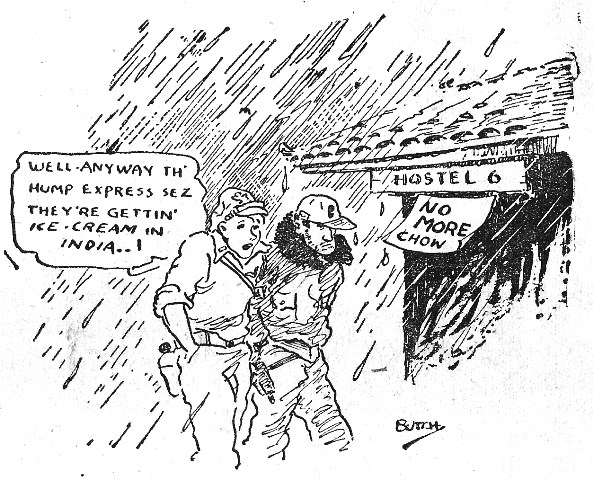
|
We do not need to become fascists or communists to overcome these "defects." We only must realize that our nation is NOT a democracy, but that we have a constitutional form of government, and govern ourselves as the constitution and our founding fathers planned.
We elect our representatives for two years, our president for four and our senators for six. We, the public, should definitely keep our eyes on what they do. We should let them know when we think they are doing wrong. Yet it is impossible for the great majority of people to know as much about the various problems the government leaders are facing as the leaders know - or should know.
Only at election time is it possible for the qualified voters among our 130 million people to give their orders directly to the nation's leaders. Between elections, those who feel they are qualified to speak on problems that arise should advise the leaders of their personal, or collective, opinions. The leaders should weigh this advice but should not follow it unless in their judgement it is sound.
Our legislators were not elected to let a few people and pressure groups tell them what to do in the absence of a direct mandate from their constituents. They were elected to carry out the orders received directly from the people at election time, and in all other cases to use their own judgement. That is why we elect them - because we think they, and not pressure groups, are best fitted to handle their particular job.
When, at the end of the two-, the four-, or the 6-year term, they give an accounting to their constituents, we can say, "Wee done," and return them for another term or, if we feel they have failed us, we can send others in their place. There are, of course, legal methods for removing a man from office during his term in case it is found necessary.
Until we abandon this myth of democracy and realize that our constitutional form of government - used as it was originally intended to be used - is still the best form of government now in existence; until our elected representatives realize they are elected to represent us all, and not just minority groups, we will continue to have no settled domestic or foreign policies. When we elect well-qualified men to public office and they, and not a loud pressure group, run those offices, then the United States will make far greater strides toward the goal of real democracy than it now does under the system of government of the many by the few.
|

|
Open Letter to Sen. Chandler
The Hon. Sen. A. B. Chandler, Washington, D.C.
Dear sir:
It has been noted in the Sept. 27 issue of the Hump Express that Maj. Gen. Claire Chennault has requested benefits such as pensions and disability allowances for the "Flying Tiger" group that served before the U.S. entry into the war.
There was an organization in the Royal Air Force known as the American Eagle squadrons, that seem to me to be in the same category.
The pilots of the Eagle squadrons fought, what seems to me, a little tougher enemy, one Eagle pilot lost for every four Germans shot down, and because they were foreign volunteers, no benefits were set up for the families of these men.
There have been numerous rumors about the pay of the Flying Tigers - $500 to $1,000 with extra pocket money for each Jap shot down. The Eagle boys' pay was $85 plus rations.
This is not to run down the Flying Tigers, but it is hoped the Eagle squadron members will be given some consideration on the proposed benefits and credit for their achievements.
Maj. William R. Dunn, 1363 BU, Liuchow (ex-squadron leader RAF VR No. 71 Eagle Squadron)
Ed.-Your letter has been forwarded to the senator, Major.




Dear Mr. Anthony
Editor: I thought since you have such a large circulation you might be able to help me locate my boyfriend.
I've written several letters which have not as yet been answered. I've asked the Red Cross for help. They say I have to wait three months. The War Department has not answered my letters, so you see I've tried several things.
My boyfriend and I had no quarrel, which leads one to believe that the silence is not his fault. Perhaps he is ill in some hospital. Last time I heard from him was Aug. 5. If you can help me in any way I would appreciate it. I know that you are not running a "lost and found department" but I had to try just once more.
(Name withheld)
Ed.-Your boyfriend is still stationed at 1311 BU, and we are forwarding your letter to him.




About that B-4 Bag
Editor: Is it fact or rumor that your B-4 bag is taken away at Karachi on the way home? We've been hearing many conflicting tales up here.
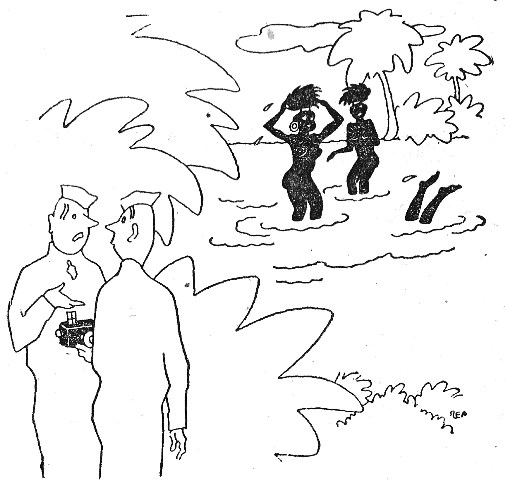
|
If, by chance, they do relieve one of his bag, what's the reason? I hate to think of carrying my clothes home in my arms. Also, what about A-2 jackets?
Ed.-According to an AAF letter many months back, non-rated personnel was ordered to turn in to tech supply all flying equipment, including B-4 bags and A-2 jackets. If this has not been done it is reasonable to assume that such equipment will be taken when one leaves the theater. Flying personnel, however, will retain such equipment, according to S&S.




Defends Red Cross
Editor: Some time ago this column carried a severe but naive criticism of the Red Cross set up in Srinagar, Kashmir. I am able to answer the fellow. First let me generalize the Red Cross in this theater has done an excellent job. These young ladies (at Srinagar) keep us damn fool GIs and officers from throwing our dough away on junk. I'll bet that the Red Cross has saved bahout rupees for those smart enough to follow their advice. To you who were so critical and frankly unfair look for good and you will find good, life is much more fun.
Cpl. Harold I. Silver, 1305 BU, Dum Dum
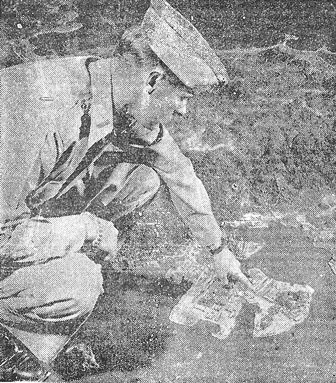 Above, tiny ships in docks at Yokosuka, noted in the latest recon run, are reproduced to give crews up-to-date, accurate information on their targets.
This represents only a small section of the miniature target constructed for the entire bomb run.
Below, a B-29 bombardier lined his sights on the target - with a motion picture.
Separate sequences in the B-29 briefing films showed bombardiers exact routes to targets and point of bomb release.
Above, tiny ships in docks at Yokosuka, noted in the latest recon run, are reproduced to give crews up-to-date, accurate information on their targets.
This represents only a small section of the miniature target constructed for the entire bomb run.
Below, a B-29 bombardier lined his sights on the target - with a motion picture.
Separate sequences in the B-29 briefing films showed bombardiers exact routes to targets and point of bomb release.
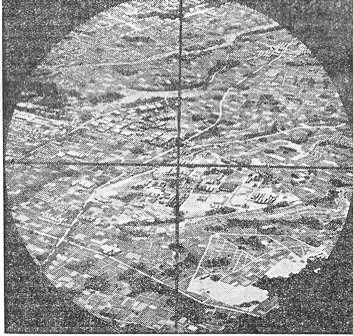
|
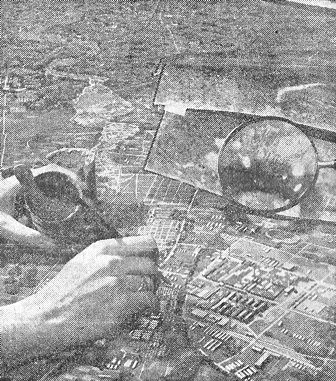 Above, an artist sketches in Camouflage patterns of a building that will be included in the target of a B-29 crew. The coliseum near the glass is a Jap
replica of the L.A. Coliseum built for the Olympic games. When Superforts bombed this target, the coliseum was used as a check point.
Below, before cameras start rolling to record the bomb run, artists put the finishing touches on a Tokyo bay miniature. The crane at the rear then moved
across the set to simulate bombing.
Above, an artist sketches in Camouflage patterns of a building that will be included in the target of a B-29 crew. The coliseum near the glass is a Jap
replica of the L.A. Coliseum built for the Olympic games. When Superforts bombed this target, the coliseum was used as a check point.
Below, before cameras start rolling to record the bomb run, artists put the finishing touches on a Tokyo bay miniature. The crane at the rear then moved
across the set to simulate bombing.
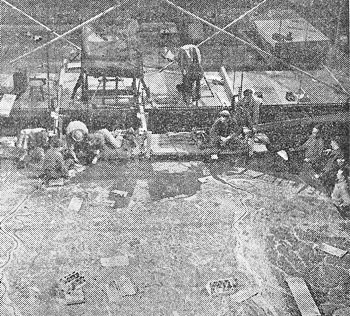
|
An outstanding example of American inventiveness which helped defeat Japan was a series of special briefing motion pictures produced by the AAF Motion Picture Unit, Culver City, Calif., which showed Superfort crews what to destroy. Lilliputian replicas of Jap targets, some representing 2,700 square miles of Nippon, were built on sound stages. The system was just revealed by Army intelligence. The targets were constructed separately and reproduced faithfully, even to the tiny smokestacks and camouflage patterns of the buildings. Below, the comparative size of the Jap miniatures constructed by the unit is shown in the photo of Capt. William G. Ryan, radar navigator, checking details of topography against latest "recon" photos. This section of the Nagasaki area was photographed from every axis of attack. Hills in the foreground are covered with trees manufactured from ground airfoam. (All photos by USAAF, Washington, D.C.)
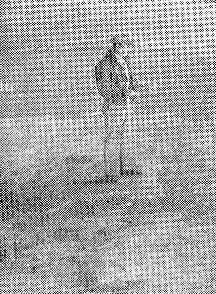
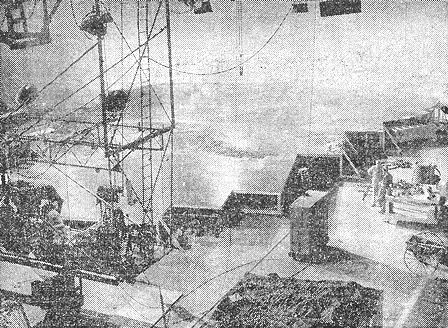 The large crane at the left was synchronized to carry the cameras over the miniature (in background) at the same speed and altitude as a Superfort.
These sets were used for the bombing of Tokyo, Nagasaki, Hiroshima, Yokohama and Yokosuka.
The large crane at the left was synchronized to carry the cameras over the miniature (in background) at the same speed and altitude as a Superfort.
These sets were used for the bombing of Tokyo, Nagasaki, Hiroshima, Yokohama and Yokosuka.
|
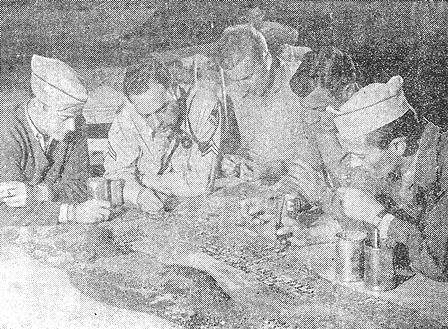 Crews of artists worked in shifts to complete individual buildings and features of targets. This entire section was later inserted in the miniature,
then photographed as it would be seen from a Superfort flying at approximately 30,000 feet.
Crews of artists worked in shifts to complete individual buildings and features of targets. This entire section was later inserted in the miniature,
then photographed as it would be seen from a Superfort flying at approximately 30,000 feet.
|
17,000 Awards
Hq., Calcutta - At total of 17,022 awards was presented to ICD personnel between Sept. 3, 1944, and Sept. 2, 1945.
Among these were 7.375 Air medals; 4,914 Distinguished Flying crosses; 3,241 Oak Leaf clusters to Air medals and 1,385 Oak Leaf clusters to DFCs.
The largest number of awards for any one month was 2,292 in March, 1945. October 1944 came next with 1,714.
Marines in North China
Shanghai (ANS) - U.S. Marines are guarding some 200 miles of railroad in north China needed to supply coal to Shanghai and the Tientsin-Peiping areas, United Press reported. The dispatch says the Marines are being deployed along the lines and are riding freight cars to halt repeated attacks by armed bands which have cut lines and set fire to trains between Tangshan-Kuyeh, a coal-producing area, and the loading port of Chingwangtao on the Gulf of China. THE NORTH CHINA MARINE
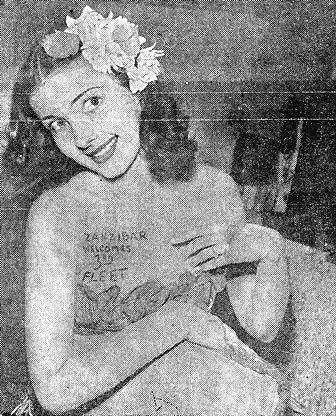 Pretty Jane Cannon, dressed as a Hawaiian girl, prepares to welcome homecoming Third Fleet bluejackets to Zanzibar, the New York nightspot.
Oooh what a luscious welcome mat!
Pretty Jane Cannon, dressed as a Hawaiian girl, prepares to welcome homecoming Third Fleet bluejackets to Zanzibar, the New York nightspot.
Oooh what a luscious welcome mat!
|
Large Scale Fight
Begins Within China
Communists Battle Forces of
Kuomintang Army in Shansi
Chungking - Full-scale fighting was reported to have broken out between Chinese communists and central government forces which, communists warned, might lead to civil war, according to ANS.
Government sources claimed 100,000 communists were attacking the Peiping-Suiyan railroad and that "tens of thousands of others poured into the Shansi province to wreck communications and storm cities held by the Kuomintang."
Administration Dispute
A communist spokesman countered with the charge that Generalissimo Chiang Kai-shek's forces were using Japanese troops and their own armed units to forment civil war. The government source, Gen. Yen Hsi Shan, said that more than 40,000,000 Chinese were involved in hostilities which followed the failure of opposing factions to agree on administration of the northern areas.
A communist military spokesman said fighting raged in 11 of China's 26 provinces, with principal clashes occurring in Hopeh-Shansi border area of north China.
Earlier this week the Central News agency had reported that 10,000 bandits, armed with mountain guns, mortars and machine guns, were attacking Sinyang in northwest Honan.
Provoked Clash
Attempts at arriving at a peaceful settlement had reached a stalemate after weeks of parleying, with government quarters insisting that the communists had "no desire for an agreement" but pursued "delaying tactics for the sake of gaining time," the Associated Press reported.
The communists, accusing the central government, said that all clashes in different parts of the country were "provoked by government troops," and warned that if Kuomintang forces tried to penetrate liberated territories in strength they would "take strong defensive action."
HUMP EXPRESS is the official newspaper of the India-China Division, Air Transport Command, APO 192, c/o Postmaster, New York, N.Y., and is published by its Public Relations office. Camp Newspaper Service and Army Newspaper Service features are used, reproduction of which is prohibited without permission of CNS and ANS, 205 East 42nd St., New York, 17, N.Y. Other material is submitted by staff members, ICD-ATC base Public Relations sections and other soldier correspondents. Printed weekly by the Hindusthan Standard, 3 Burman St., Calcutta, India, and distributed each Thursday. Passed by U.S. Press Censor for mailing.

NOVEMBER 1, 1945
Original issue of HUMP EXPRESS shared by Barbara Skinner Lipiew
Copyright © 2018 Carl Warren Weidenburner
TOP OF PAGE PRINT THIS PAGE ABOUT THIS PAGE E-MAIL YOUR COMMENTS
PREVIOUS ISSUE HUMP EXPRESS BASE NEXT ISSUE
